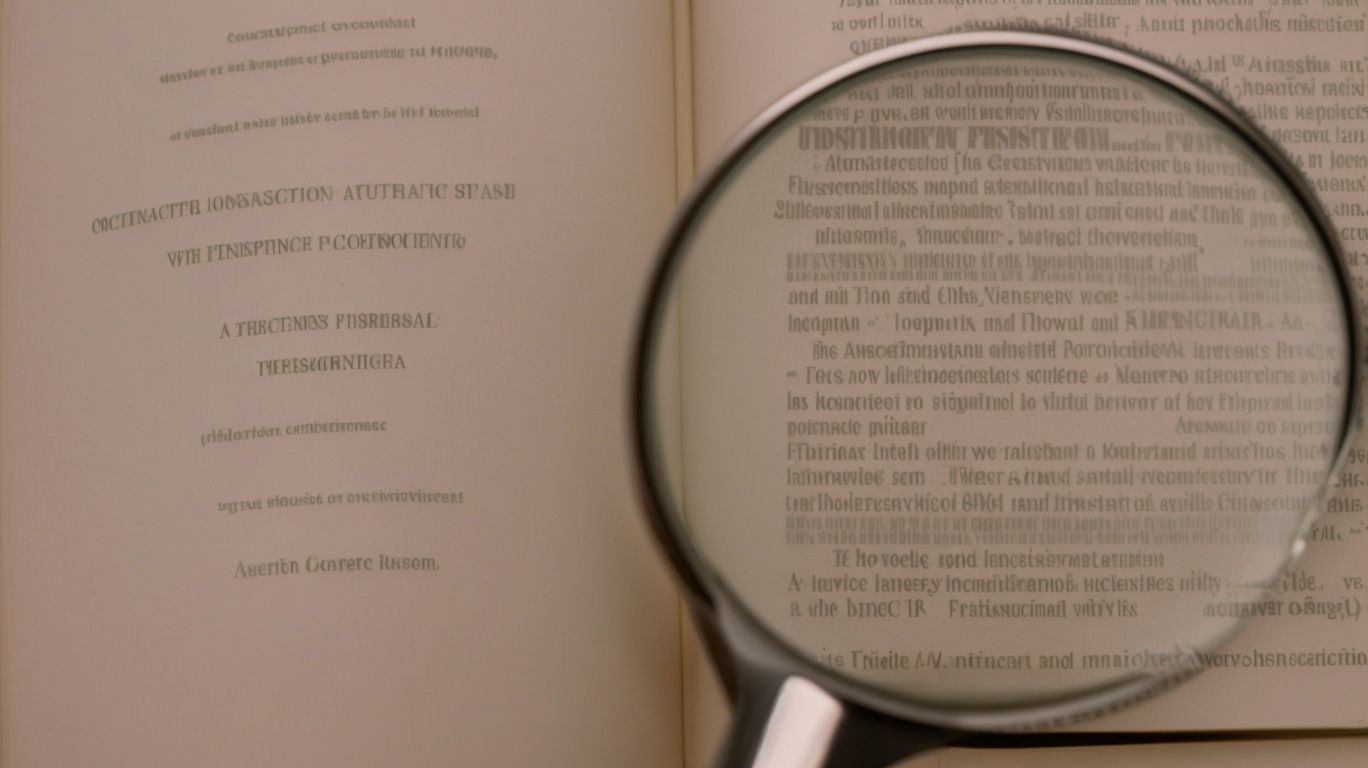Are you interested in the field of forensic psychology and wondering where to study? Look no further! In this comprehensive guide, we will explore the top institutions for studying forensic psychology, including John Jay College of Criminal Justice, University of California, Irvine, and more.
We will also discuss the admission requirements for these schools and the exciting career opportunities available to graduates. Stay tuned to learn more about this fascinating and rewarding field!
Contents
- 1 What is Forensic Psychology?
- 2 Why Study Forensic Psychology?
- 3 What Are the Top Institutions for Studying Forensic Psychology?
- 3.1 John Jay College of Criminal Justice
- 3.2 University of California, Irvine
- 3.3 University of Denver
- 3.4 University of Virginia
- 3.5 University of Nebraska-Lincoln
- 3.6 University of North Carolina at Chapel Hill
- 3.7 University of California, Berkeley
- 3.8 University of Southern California
- 3.9 University of Illinois at Chicago
- 3.10 University of Arizona
- 4 What Are the Admission Requirements for These Institutions?
- 5 What Are the Career Opportunities for Graduates of These Institutions?
- 6 Frequently Asked Questions
- 6.1 What are the top institutions to study forensic psychology?
- 6.2 What sets these institutions apart as the best for studying forensic psychology?
- 6.3 Are there any specific areas within forensic psychology that these institutions excel in?
- 6.4 Do these institutions offer hands-on experience in the field of forensic psychology?
- 6.5 Can students pursuing a degree in forensic psychology also obtain a license to practice as a psychologist?
- 6.6 How can I determine which of these top institutions is the best fit for me?
What is Forensic Psychology?
Forensic psychology is a specialized field that combines psychology and the legal system to understand criminals’ behavior, provide insights for legal proceedings, and contribute to enhancing security in correctional systems and homeland security.
Forensic psychology plays a crucial role in criminal investigations by utilizing psychological principles to analyze behaviors, motives, and patterns of criminal activities. By applying psychological theories to understand criminal minds, forensic psychologists assist law enforcement agencies in profiling suspects and identifying potential risks. In court cases, these professionals often serve as expert witnesses, offering evaluations and testimonies that shed light on the mental state and intentions of the accused.
Why Study Forensic Psychology?
Studying forensic psychology offers students the opportunity to delve into the intersection of psychology and the legal system, preparing them for rewarding careers as forensic psychologists and providing a deep understanding of criminal behavior and justice.
Forensic psychology programs equip students with a unique blend of skills from both psychology and law, allowing them to analyze criminal motives, assist in legal proceedings, and contribute to the rehabilitation of offenders. By understanding the complexities of human behavior within the context of the legal framework, forensic psychology students gain the tools to make a positive impact on society by promoting fair trials, aiding in criminal investigations, and providing expert testimony in various legal settings.
What Are the Top Institutions for Studying Forensic Psychology?
For those aspiring to study forensic psychology, several top institutions stand out, such as John Jay College of Criminal Justice, University of California, Irvine, and University of Denver, known for their rigorous programs, expert professors, and comprehensive curriculum.
John Jay College of Criminal Justice boasts a renowned faculty that includes experts in the field with practical experience, enriching the educational experience for students.
The University of California, Irvine, offers cutting-edge research opportunities and internships, creating a dynamic learning environment.
At the University of Denver, students benefit from a well-rounded curriculum that combines theoretical knowledge with hands-on training, preparing them for real-world applications in forensic psychology.
John Jay College of Criminal Justice
John Jay College of Criminal Justice, part of the City University of New York (CUNY) system, offers a renowned forensic psychology program known for its academic excellence, diverse coursework, and competitive tuition rates.
The forensic psychology program at John Jay College delves into a wide array of topics, including criminal behavior analysis, psychological assessment, and research methods. The faculty members are experts in the field, bringing a wealth of real-world experience to the classroom. CUNY’s commitment to providing a comprehensive education is reflected in the curriculum that combines theoretical knowledge with practical skills.
Students benefit from small class sizes, allowing for personalized attention and mentoring. The tuition fees for the program are competitive, making quality education affordable. Admission requirements typically include a strong academic background, letters of recommendation, and a statement of purpose.
University of California, Irvine
The University of California, Irvine, is a prestigious institution known for its comprehensive forensic psychology studies, diverse coursework options, and renowned professors with expertise in the field.
The forensic psychology programs at the University of California, Irvine, offer a rich variety of courses tailored to meet the demands of this specialized field. From core subjects like criminal behavior analysis and forensic assessment to advanced topics in forensic interviewing techniques and legal issues in psychology, students are exposed to a well-rounded curriculum. The faculty members, who are experts in various subfields of forensic psychology, bring a wealth of experience from both research and practical applications, enriching the learning experience.
University of Denver
The University of Denver, home to the Graduate School of Professional Psychology, offers esteemed forensic psychology programs that cater to students’ diverse needs and career aspirations, providing a solid foundation for advanced studies and professional growth.
Students pursuing a forensic psychology degree at the University of Denver benefit from a comprehensive curriculum that covers a wide range of topics, including criminal behavior analysis, psychological assessment techniques, and legal principles.
- Degree requirements encompass both theoretical coursework and practical experience through internships and research projects, ensuring a well-rounded education.
The university also boasts master’s programs in forensic psychology designed to equip students with advanced knowledge and skills in the field. These programs offer specialized tracks such as forensic assessment, juvenile justice, and victim services, allowing students to focus on their areas of interest.
What sets the Graduate School of Professional Psychology apart is its emphasis on experiential learning. Students have the opportunity to work with faculty members on cutting-edge research projects, collaborate with local law enforcement agencies, and gain hands-on experience in real-world settings.
University of Virginia
The University of Virginia stands out for its comprehensive forensic psychology coursework, preparing students for diverse career opportunities in the field by offering a robust educational foundation and practical skills development.
Students enrolled in the forensic psychology program at the University of Virginia delve into various areas such as criminal behavior analysis, psychological assessment techniques, and courtroom procedures. The coursework not only covers theoretical knowledge but also provides hands-on experience through internships, research projects, and simulated case studies. Graduates emerge well-equipped with critical thinking, communication, and analytical skills essential for success in careers as forensic psychologists, criminal profilers, victim advocates, or consultants for law enforcement agencies.
University of Nebraska-Lincoln
The University of Nebraska-Lincoln offers specialized concentrations and areas of study within forensic psychology, allowing students to focus on specific interests and tailor their educational experience to match their career goals and aspirations.
Students in the forensic psychology program at the University of Nebraska-Lincoln have the opportunity to delve into intriguing concentrations such as criminal behavior analysis, victimology studies, forensic mental health assessment, and rehabilitation methods.
By selecting a concentration, students can gain in-depth knowledge and practical skills in their chosen area, preparing them for roles in law enforcement, healthcare, legal consulting, or academia.
The flexibility to customize their curriculum enables students to explore diverse topics like criminal profiling, juvenile justice, forensic neuropsychology, or eyewitness testimony reliability.
University of North Carolina at Chapel Hill
The University of North Carolina at Chapel Hill offers a distinguished forensic psychology coursework structure, reflected in its high rankings and recognition within the field, providing students with a top-tier educational experience.
Ranked among the top programs in the nation, the forensic psychology curriculum at UNC Chapel Hill encompasses a comprehensive blend of theoretical knowledge and practical skills. The coursework is designed to immerse students in the intricacies of the criminal justice system, criminal behavior analysis, and psychological assessment techniques crucial in forensic settings. This rigorous academic program equips graduates with the expertise needed to excel in various career paths, including forensic psychology research, criminal profiling, and expert testimony in courtrooms.
University of California, Berkeley
The University of California, Berkeley, boasts a faculty of renowned professors in the field of forensic psychology, making it a hub of academic excellence and research innovation for aspiring forensic psychology students.
These distinguished academics bring a wealth of experience to the table, offering students a deep dive into the intricate world of forensic psychology. Their research initiatives delve into cutting-edge areas such as criminal behavior analysis, forensic assessment techniques, and legal psychology.
Students at UC Berkeley are not only exposed to top-tier faculty but also benefit from state-of-the-art research facilities and cross-disciplinary collaborations, providing a comprehensive education in this dynamic field.
University of Southern California
The University of Southern California is recognized for producing forensic psychology experts who excel in various career paths, with graduates commanding competitive salaries and contributing significantly to the field.
USC alumni in forensic psychology stand out for their unmatched expertise, shaping the industry with their knowledge and skills. The rigorous curriculum and top-tier faculty at USC equip students with the necessary tools to succeed in demanding roles within the field.
Forensic psychology professionals from USC are sought after for their specialized training, problem-solving abilities, and deep understanding of human behavior, allowing them to earn attractive salaries that reflect their expertise and experience.
University of Illinois at Chicago
The University of Illinois at Chicago offers comprehensive doctoral programs in forensic psychology, providing aspiring professionals with advanced education and specialized training to excel in the field and contribute to cutting-edge research.
Students enrolled in the doctoral programs benefit from a curriculum that combines theoretical knowledge with hands-on practical experience, equipping them with the necessary skills to tackle real-world challenges. The faculty members at the University of Illinois at Chicago are renowned experts in their respective fields, offering mentorship and guidance to students as they delve into subjects such as criminal behavior analysis, forensic assessment techniques, and legal issues in forensic psychology. Research opportunities are abundant, allowing students to engage in groundbreaking studies that push the boundaries of knowledge in forensic psychology.
University of Arizona
The University of Arizona equips students with the skills and knowledge required for diverse forensic psychology careers, offering a robust educational experience that prepares graduates for rewarding job opportunities in the field.
Forensic psychology is a compelling field that merges principles of psychology and law to address legal matters. At the University of Arizona, students delve into the complexities of criminal behavior, mental health issues, and the judicial system. Through hands-on practical training, research projects, and case studies, students gain valuable insights and analytical skills crucial for roles like forensic psychologists, criminal profilers, victim advocates, or experts in criminal behavior analysis. Graduates are well-equipped to work in diverse settings such as law enforcement agencies, court systems, mental health facilities, or private consultancy firms.
What Are the Admission Requirements for These Institutions?
To pursue forensic psychology programs at top institutions, students must meet specific admission requirements, including maintaining a competitive GPA, submitting standardized test scores, providing a compelling personal statement, and securing strong letters of recommendation.
Grade point average (GPA) holds significant weight in the application process, acting as a gauge of academic performance and capability. Institutions often look for a GPA above a certain threshold, typically around 3.5 or higher, to ensure that candidates possess the necessary academic foundation.
Standardized test scores, such as the GRE, are another crucial component. These scores demonstrate a student’s aptitude and readiness for graduate-level coursework in forensic psychology.
Personal statements offer applicants the opportunity to showcase their passion for the field, relevant experiences, and future goals. A well-crafted statement can provide insight into a candidate’s personality, motivations, and commitment to the program.
Letters of recommendation, usually from professors or professionals in the field, offer a third-party perspective on an applicant’s qualifications, work ethic, and potential for success in the program. Strong recommendations can greatly enhance an application.
GPA and Test Scores
Maintaining a competitive GPA and achieving strong standardized test scores play a crucial role in meeting the admission requirements of universities and colleges offering forensic psychology programs, showcasing academic readiness and commitment.
Forensic psychology programs are highly competitive, with universities and colleges seeking applicants who demonstrate excellent academic potential. A high GPA not only reflects a student’s ability to excel in their coursework but also signals a dedication to academic achievement. Beyond grades, standardized test scores, such as the GRE, provide an additional metric for evaluating a student’s readiness for advanced studies in this field. Admissions committees rely on these metrics to assess the likelihood of a student’s success in the program and their ability to contribute positively to the academic environment.
Personal Statement or Essay
Crafting a compelling personal statement or essay is essential for meeting the admission requirements of forensic psychology programs, allowing students to showcase their motivations, aspirations, and unique qualities that align with the program’s objectives.
As personal statements serve as a critical component of the application process, they offer a platform for applicants to convey their passion for forensic psychology. Through well-articulated narratives, students can demonstrate a deep understanding of the field and illustrate how their academic background, work experience, and personal values harmonize with the program’s focus on criminal behavior analysis, psychological assessment, and rehabilitation. Admission committees assess these documents to gauge the applicant’s potential contribution to the academic community and their readiness to engage in rigorous coursework and research.
Letters of Recommendation
Strong letters of recommendation from professors or professionals in the field are vital components of the admission requirements for forensic psychology programs, providing insights into the applicant’s academic abilities, character, and potential contributions to the university.
These letters offer admissions committees a glimpse into the applicant’s past performance, work ethic, and interpersonal skills, enabling them to evaluate the student beyond just their academic transcripts and test scores.
Letters of recommendation often highlight specific instances where the applicant demonstrated critical thinking, problem-solving abilities, and a passion for forensic psychology, painting a comprehensive picture of the candidate’s suitability for the program. They serve as a personalized endorsement of the student’s capabilities and potential to excel in the rigorous curriculum.
Relevant Experience or Coursework
Demonstrating relevant experience or coursework in the field of forensic psychology is beneficial for meeting the admission requirements of programs, showcasing a student’s practical knowledge, skills, and dedication to advancing their studies.
This readiness engendered by practical exposure and academic training enables applicants to assimilate complex psychological concepts and analytical methodologies essential for addressing criminal behavior. By diving into courses like Criminal Psychology, Behavioral Analysis, and Psychopathology, individuals cultivate a comprehensive understanding of the intricacies involved in forensic investigations. Hands-on experience gained through internships or research projects underlines a candidate’s commitment to applying theoretical knowledge to real-world scenarios, which is a pivotal aspect of forensic psychology program admissions.
What Are the Career Opportunities for Graduates of These Institutions?
Graduates of forensic psychology programs from top institutions have diverse career opportunities, ranging from becoming forensic psychologists, criminal profilers, jury consultants, correctional psychologists, to expert witnesses, contributing to the legal and psychological aspects of the justice system.
Forensic psychologists, for instance, work within the legal system, applying their expertise to assist in legal cases, evaluating mental competency, and offering therapeutic services.
Criminal profilers delve into criminal behavior, aiding law enforcement in understanding offenders’ motives and patterns.
Jury consultants provide insights into juror behavior and help attorneys choose the most favorable jury for a case.
Correctional psychologists engage in rehabilitation programs within correctional facilities to aid in prisoner reform.
Expert witnesses testify in court to offer specialized knowledge that aids in legal decision-making.
Forensic Psychologist
A career as a forensic psychologist offers professionals the opportunity to apply psychological principles to legal issues, work with law enforcement agencies, and provide expert testimony in court, making a significant impact on the justice system and the lives of individuals involved.
Forensic psychologists play a critical role in criminal investigations by assessing the mental state of individuals involved in legal proceedings, aiding in understanding motives and behavior. Their evaluations help determine competency, assess the risk of reoffending, and provide crucial insights for sentencing decisions. They collaborate with attorneys to prepare strategy, select juries, and develop legal defenses.
Forensic psychologists may also work in diverse settings such as correctional facilities, mental health institutions, or private practices, offering counseling and therapy to individuals affected by crime or trauma.
Criminal Profiler
Becoming a criminal profiler allows individuals to analyze criminal behavior, create offender profiles, and assist law enforcement agencies in solving crimes, using their expertise in forensic psychology to contribute to criminal investigations and justice.
Criminal profilers play a crucial role in understanding the motivations behind criminal actions, uncovering patterns in criminal behavior, and predicting potential future criminal activities. By examining crime scenes, victimology, and evidence, profilers can decipher intricate details that may elude ordinary investigators.
Psychological profiling is a key tool they employ to deduce personality traits, behavior patterns, and possible triggers of offenders, aiding in narrowing down suspects and focusing investigations.
Jury Consultant
Jury consultants assist legal teams in selecting juries, preparing trial strategies, and understanding juror behavior, leveraging their knowledge of psychology and law to provide insights that influence the outcome of legal proceedings and court cases.
By analyzing the demographics, personality traits, and potential biases of prospective jurors, jury consultants play a crucial role in helping lawyers make informed decisions during jury selection. Their expertise in psychology allows them to identify juror tendencies and predict potential reactions to arguments presented in court.
Additionally, understanding the intricate dynamics of legal processes enables them to strategize effectively, advising on everything from witness preparation to the use of visual aids in the courtroom.
Correctional Psychologist
Correctional psychologists work within correctional systems to provide mental health services, support rehabilitation efforts, and assess and treat individuals in correctional facilities, playing a crucial role in promoting inmate well-being and contributing to the reintegration process.
These professionals are specialized in dealing with the unique challenges faced by individuals in the justice system, offering counseling and therapy to help inmates manage their emotions and behaviors effectively. Correctional psychologists collaborate with other professionals, such as correctional officers and social workers, to develop personalized treatment plans that address the specific needs of each individual. They conduct assessments to evaluate the mental health status of inmates and provide interventions to support their psychological well-being.
Expert Witness
Expert witnesses provide specialized knowledge and insights in legal proceedings and court cases, offering expert opinions based on their expertise in forensic psychology to assist judges, juries, and legal teams in understanding complex psychological aspects of cases.
These professionals play a crucial role in bridging the gap between complex psychological concepts and the legal system, ensuring that the justice system considers all relevant evidence and viewpoints during trials. Expert witnesses are often called upon to explain intricate psychological theories, behaviors, or evaluations in a language that is accessible to non-specialists in the courtroom setting.
Frequently Asked Questions
What are the top institutions to study forensic psychology?
The top institutions to study forensic psychology include John Jay College of Criminal Justice, University of California – Irvine, and Marymount University.
What sets these institutions apart as the best for studying forensic psychology?
These institutions have highly respected programs, renowned faculty, and specialized curriculum that prepare students for careers in the field of forensic psychology.
Are there any specific areas within forensic psychology that these institutions excel in?
Yes, some of the top institutions offer concentrations in areas such as criminal behavior, victimology, and forensic assessment, allowing students to gain expertise in their specific areas of interest.
Do these institutions offer hands-on experience in the field of forensic psychology?
Many of these top institutions offer internships and practical training opportunities in forensic psychology, giving students the chance to apply their knowledge in real-world settings.
Can students pursuing a degree in forensic psychology also obtain a license to practice as a psychologist?
Yes, some of these top institutions offer programs that meet the educational requirements for licensure as a psychologist, allowing students to pursue both a degree and a license.
How can I determine which of these top institutions is the best fit for me?
It is important to research each institution’s program, faculty, and resources to determine which aligns best with your academic and career goals. You can also reach out to current students or alumni for their insights and experiences.






